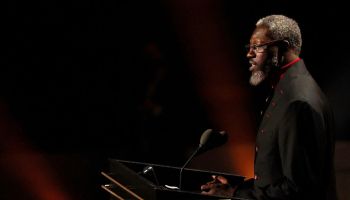On August 11, Yahoo! Movies debuted the premier theatrical poster for the upcoming Julie Taymor film The Tempest, the latest reimagining of William Shakespeare.
Taymor, who has directed visually stunning feature length films like Titus, Frida and most recently Across the Universe is also known for having exciting casts. The feminist re-visioning of Billy’s acclaimed play will feature a silver skinned, arsenic eyed spirit Ariel and most disturbingly, a crater-faced, burn victim brute. The latter, played by Beninese-American thespian Djimon Hounsou—a two-time Academy Award nominee—is that of Caliban, one of Billy’s most beloved characters.
Billed as a fantasy drama, Hounsou portrays a savage and one of the main antagonists of the play. While his character is evil in his appearance and has an air of feral ferocity to him, we can’t help but note the uncomfortable ties blacks everywhere may feel towards this. Look at how blacks have been drawn (and erased) throughout history. Look at Mickey Mouse and his gang, King Louie from The Jungle Book or Sunflower the Centaur from Fantasia. African-Americans aren’t necessarily portrayed as human, but as heathens. Considering Paul Robeson, Michael Clarke Duncan and Tom “Zeus” Lister Jr. have all portrayed golems while achieving fame, we’re absolutely turned off by the studio’s decision in casting Hounsou.
It’s pretty much a damned if you do, damned if you don’t dilemma as dissected in the book “Black male fiction and the legacy of Caliban” by James Wilmouth Coleman. The book, which argues that Billy created an archetype that black fiction writers unconsciously revisit through liberation and revolution, make us question Hollywood’s cultural insensitivity.
However, playing Devil’s Advocate, there are pros in being cast in the role Caliban:
1.
Diversity: There’s an unspoken rule in post Civil Rights-era Hollywood that blacks need to fit in where they get in. Since, there a few black actors with the same opportunities as their peers, we’re just happy they gave Hounsou the role.
2.
Trailblazing: There are only a handful of black characters in Shakespeare land, literally. (Okay, so that’s a stretch. Two major characters is not a handful.) Since Taymor did an update on Titus Andronicus over a decade ago with Harry Lennix in the role of Aaron—even Mekhi Phifer in O—we’re glad to see a black male being the primary foil in the film.
3.
Passages: Despite his physique, grotesque facial façade and jambalaya mushmouth ideology, Caliban is known for producing some of the most gorgeous passages Shakespeare has ever written. Ever:
Be not afeard; the isle is full of noises,
Sounds, and sweet airs, that give delight and hurt not.
Sometimes a thousand twangling instruments
Will hum about mine ears; and sometime voices
That, if I then had waked after long sleep,
Will make me sleep again; and then in dreaming,
The clouds methought would open, and show riches
Ready to drop upon me, that when I waked
I cried to dream again.
4.
Caliban’s name: “Traditionally,” the brute’s name which means blackness in Romani as well as “wild dog” is Arabic, its probably a no-brainer why the studio went with a black actor to play a rogue beast man a la The Hills Have Eyes.
However, we’re still on the fence. Get your cardboard signs ready just in case. The Tempest will splash on to the silver screen in theaters nationwide on December 10.
OPINION: Sagging Pants Dehumanizes Black Men
OPINION: What “Precious” Tells Us About Images Of Blackness
"The Tempest" poster portrays Djimon Hounsou as monster was originally published on giantlife.com















